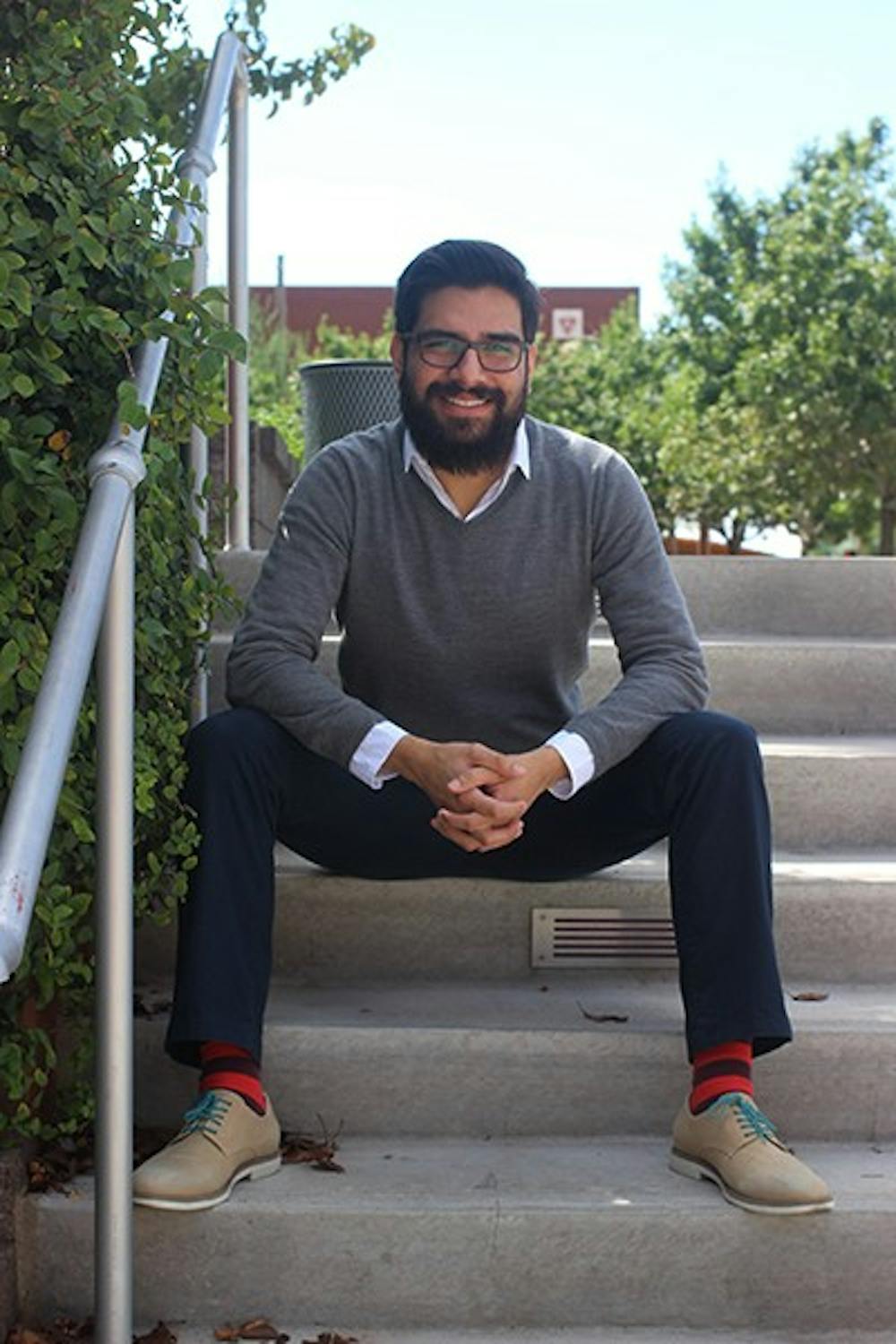 Social justice and human rights graduate student Carlos Perez launched Directus International, a platform for advocacy and fight for social justice in the United States and across the world. (Photo by Katie Malles)
Social justice and human rights graduate student Carlos Perez launched Directus International, a platform for advocacy and fight for social justice in the United States and across the world. (Photo by Katie Malles)
ASU social justice and human rights graduate student, Carlos Perez Rojas, is shedding light on social injustices with his new human rights organization Directus International.
Perez Rojas said Directus International is a human rights organization geared at creating documentary films, photography and written analysis about social injustices and human rights’ abuses around the world.
“It’s not enough just to say or write about it, a combination of writing about it and looking at it may awake things,” Perez Rojas said.
The organization provides a platform for people who face discrimination and whose rights are abused to make their case and talk about their experiences. Focusing on individuals experiencing homelessness, members of LGBTQ community, people of color and illegal immigrants, Directus International pays close attention to the intersectionality.
“Directus International is a tool for people to fight the battles and something for us to listen to,” Perez Rojas said.
Perez Rojas received a bachelor’s degree in economics in Venezuela. While getting work experience, Perez Rojas, a part of the LGBTQ community, faced discrimination at his workplace. Instances of oppression ignited the idea of starting an organization called the Freedom Project to provide young LGBTQ people in Venezuela with the resources to be able to stand their ground.
After receiving the Fulbright scholarship to come and study social justice and human rights at ASU, Perez Rojas was inspired to make a documentary about the people experiencing homelessness, the first project of Directus International, by paying close attention to details at public places in Arizona.
Signs at public places such as “Refill your drink only on your first visit” and “No bed rolls, duffle bags, suitcases or large plastic bags allowed in the restaurant” gripped Perez Rojas's attention.
Reading between the lines, Perez Rojas realized that such signs address homeless people, putting them in an unequal position compared to others, who look like “typical students,” who can freely refill their drinks, he said.
“People see a heavy bag, a little dishevelment, a little sunburn – signs of homelessness – and they are putting an eagle eye on what they are doing, but they don’t pay that precise attention to somebody else,” he said. “So that tells us that these measures are geared towards them, and there’s something unwritten about it, something that’s being instructed to workers to pay a closer look at people that look this or that way. And that’s discrimination, and that’s oppression.”
In the first documentary “Unwelcome. Chapter One.” Directus International explores oppression and hardships of those experiencing homelessness through the eyes of Gary, an Arizonan homeless man, and highlights that some types of oppression contribute to keeping people homeless.
Individuals experiencing homelessness are discriminated against both actively and through blatant inaction. When people make an effort to walk 5 feet away from a homeless person on a street, they need to be more aware of the surroundings to realize they may hurt that person unintentionally, Perez Rojas said.
“As a society we are all co-participants, and we are all engaged in the social injustices and oppression,” he said. “The interesting thing about social injustices is that you don’t have to actively go out and take somebody from their house, put them in the street and say, 'I made you homeless.' But inaction is as powerful as direct action.”
Changes in the policies and culture lead to the cultivation of “out of sight, out of mind” ideas in society when treating homelessness, Perez Rojas said.
With the documentaries, Directus International intends to open people’s eyes to the problem and awaken them to the surroundings.
“I think action or change takes time, the first step towards that change is opening your eyes,” he said. “If you feel something when watching the documentary – that’s a step, that’s a progress.”
ASU alumna Marena Bridges has been supporting Perez Rojas with his ideas and undertakings throughout his journey. The documentary aims to make people re-evaluate homelessness and think about it critically, she said.
“To me, it’s already starting to have an impact,” she said. “It’s an eye-opener. You’d be surprised how many policies companies have that produce a negative effect on homeless people.”
Patricia Clark, Associate Professor of Media Arts for the Interdisciplinary Arts and Performance Department, advised Perez Rojas on the technical and content side of the first documentary. The exclusion of the homeless is unwelcoming and inhumane, Clark said, and the documentary might initiate the possible change to treat people equally.
“It was an interesting observation on an interesting aspect of homelessness,” Clark said. “I think the documentary could bring more awareness to businesses, city planners and corporations to understand these people don’t have equitable conditions and drop that arbitrary exclusion.”
Reach the reporter at kmaryaso@asu.edu or follow on Twitter @KseniaMaryasova




